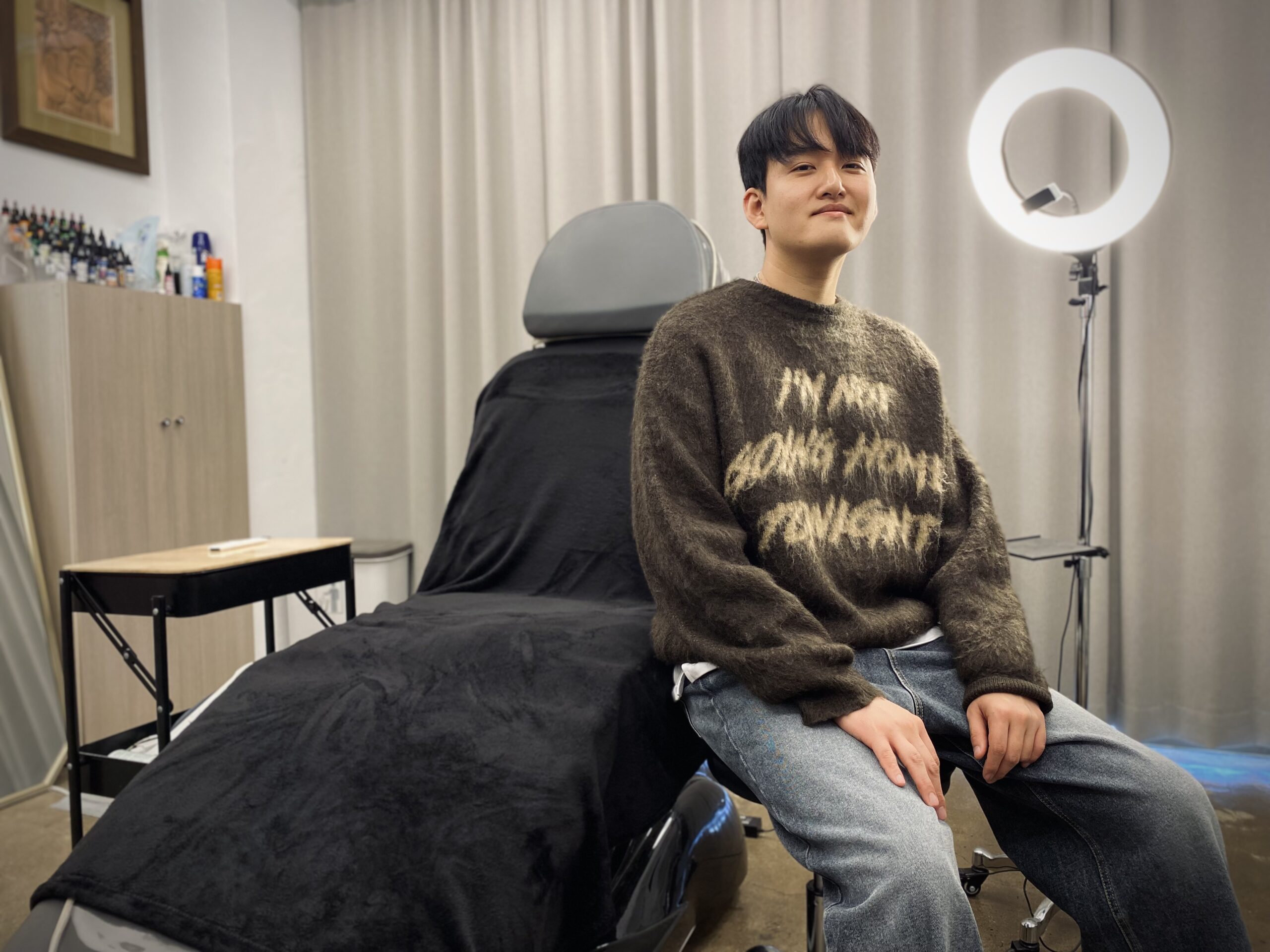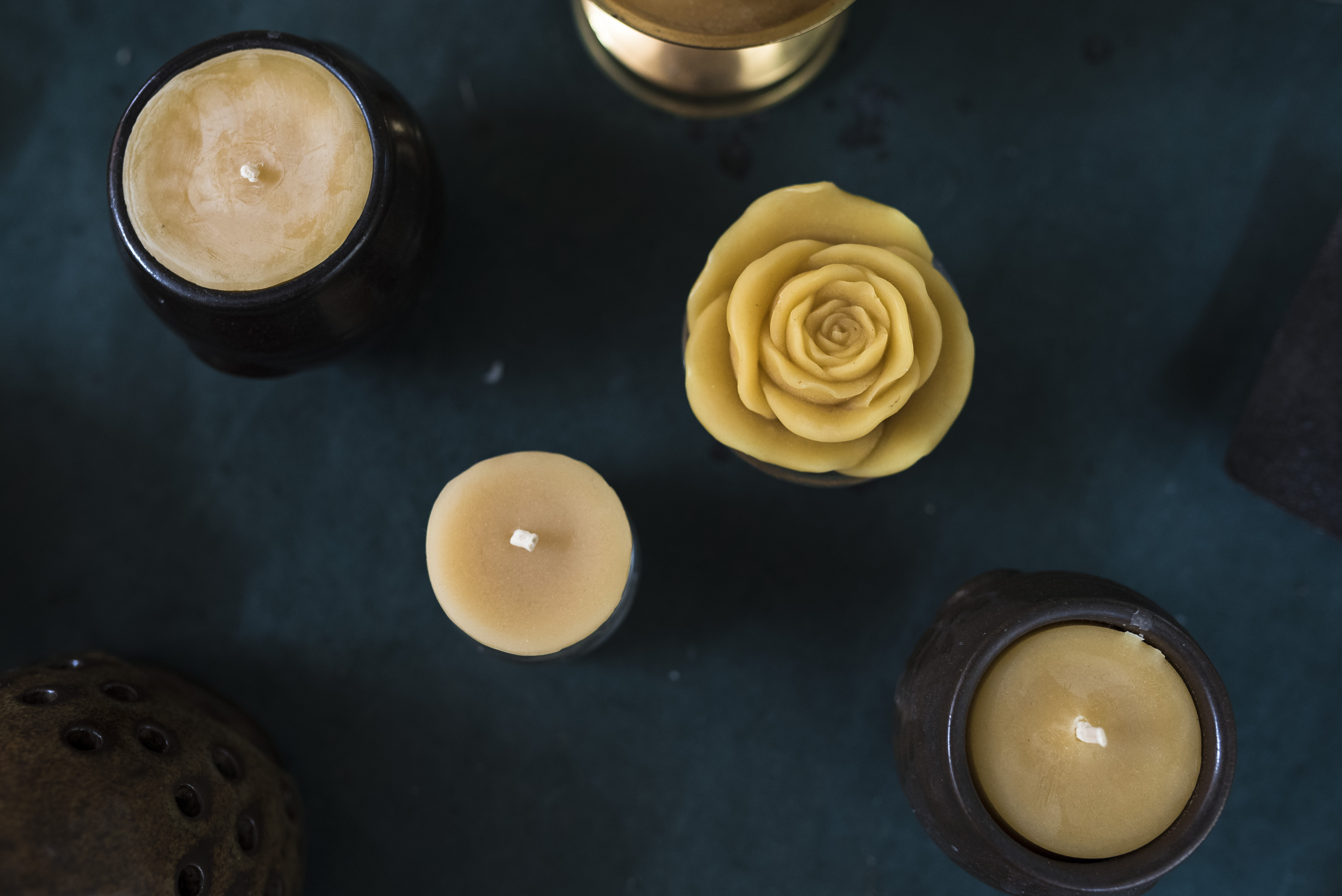The First Beeswax Candlemakers in Korea’s Modern Age
Written by Zico Mulia
Photographed by Lorryn Smit
Do you know about beeswax candles? Maybe some of you do. I did not know about them until I decided to write about Bin Do-rim, a well-known beeswax candlemaker in Korea, for the feature article of the Gwangju News. To give a brief background, beeswax candles have been a sophisticated means of illumination since ancient times in both Europe and Asia. In Korea, they were used in the royal court and during special ceremonies in the residences of the aristocracy.
To get the story on Bin, a German-born man with the birth name Dirk Fuendling, I along with Lorryn Smit (the Gwangju News’s own photo editor) interviewed him at his home. His home and workshop are located in the beautiful mountains of Damyang County near Gwangju. Our trip from Gwangju took almost an hour. Once inside the Damyang area, we passed a beautiful lake and enjoyed the silence of the green mountain scenery.
During the interview, Bin’s wife and work partner, Lee Young-hee, accompanied us. Our interview with them was warm and relaxing because of their hospitality and the peaceful atmosphere of their home. Here is how our conversation went.
Gwangju News (GN): Can you tell me about your history with Korea?
Bin: I was born in Berlin, Germany. I came to Korea to study Korean language in Seoul for three years. And then I went back to Germany to the first university that had a Korean studies department and finished my studies there in 1984. In that year, I got my Ph.D. and then came back to Korea. At first, I was teaching at a university in Daegu for eight years. Then I got dragged away to the German Foreign Service and worked at the German Embassy in Seoul for ten years. After that, we came here. We built this house a little bit earlier. I’d finished working at the embassy by the year 2000 and we resettled here in 2002. After that, we moved our permanent residence to this place. We’ve lived in Damyang for almost 20 years.
GN: So you’ve been living in Korea for a long time, and now you’re a Korean citizen. Can you tell us when and why you became a Korean citizen?
Bin: I’ve been a Korean citizen since 2005. It was kind of a logical development because I’m living here and am quite settled here. And, personally, I don’t have much connection to Germany anymore, though my children are living there – but that’s it. My parents passed away. I have no siblings and no other relatives, actually. There isn’t very much that connects me with Germany anymore. Now I’ve been living in Korea for about 40 years, so the plan to stay here is a kind of logical development – to become a member of the society you’re living in. Now we do a lot of work in the local community. For example, I became the chairman of Cooperative Founders here in the municipality of Daedok, and I’m a member of the Citizen’s Committee. So I regularly engage in community activities.
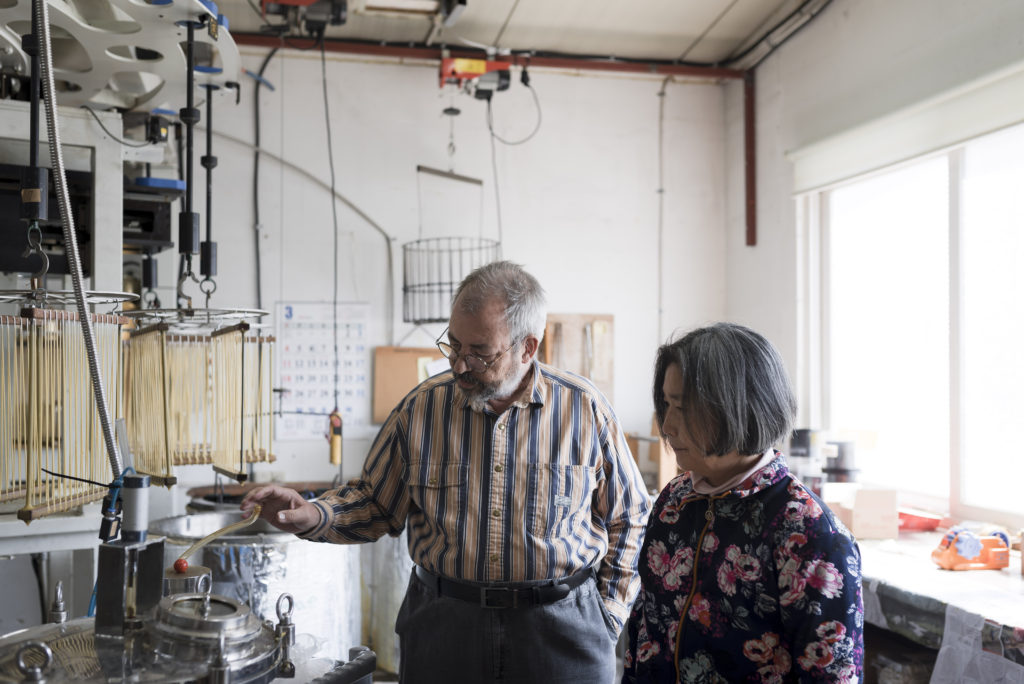
GN: When did you become a beeswax candlemaker? And why a candlemaker?
Bin: We started our candle business in 2003. It was a very slow start for our business. In the beginning, it was a hobby. We made “family candles” for friends and for ourselves after I discovered that beeswax wasn’t used in Korea at that time. And from a certain time – I don’t remember when exactly – we were able to sustain ourselves with this business. Then we increased our capacity and invested in some machinery. Some of the big changes have come from selling our product on the Internet and at shopping malls, which allows people to put in orders.
Our second biggest service customer is a Hansalim cooperative. We’re a member of the Hansalim producer’s organization. Hansalim is basically for organic foodstuffs, but they have a segment of non-food items like pottery, cosmetics, soaps, and our candles. We’re members because we make natural candles. We solely use beeswax without any additives, and the candles are made with all Korean products. Hansalim is very much concerned about using local and natural ingredients. They’re a national cooperative that’s active all over the country.
It started as a hobby and, of course, it took some time to learn the necessary skills. I wasn’t trained in candlemaking. In Germany, they have candlemaking as a craft. You learn for three years, and then you have an examination, after which you get a certificate. Here in Korea, they don’t have this. I didn’t have these three years of training, so I had to learn from books and, of course, we visited some places in Germany where they make beeswax candles. They also make them in Australia, America, and in most European countries. Here in Korea, we were the first to do so in the modern era, making us famous.
Hundreds of years ago, everybody had beeswax candles because they were the only type of candles available. In Korean folklore and in museums in Seoul, you still can see some old candles that were used only in the royal court. These, too, were made from beeswax. Then in the 19th century, we got a product from mineral oil called paraffin. It’s the material normally used for candles today because it’s cheaper and easier to make. But it’s not good for your health because when you burn paraffin, it’s like sleeping around the rear end of a running car. So the fuel of a gasoline engine is similar to the stuff they used in paraffin candles. Beeswax doesn’t have this problem.
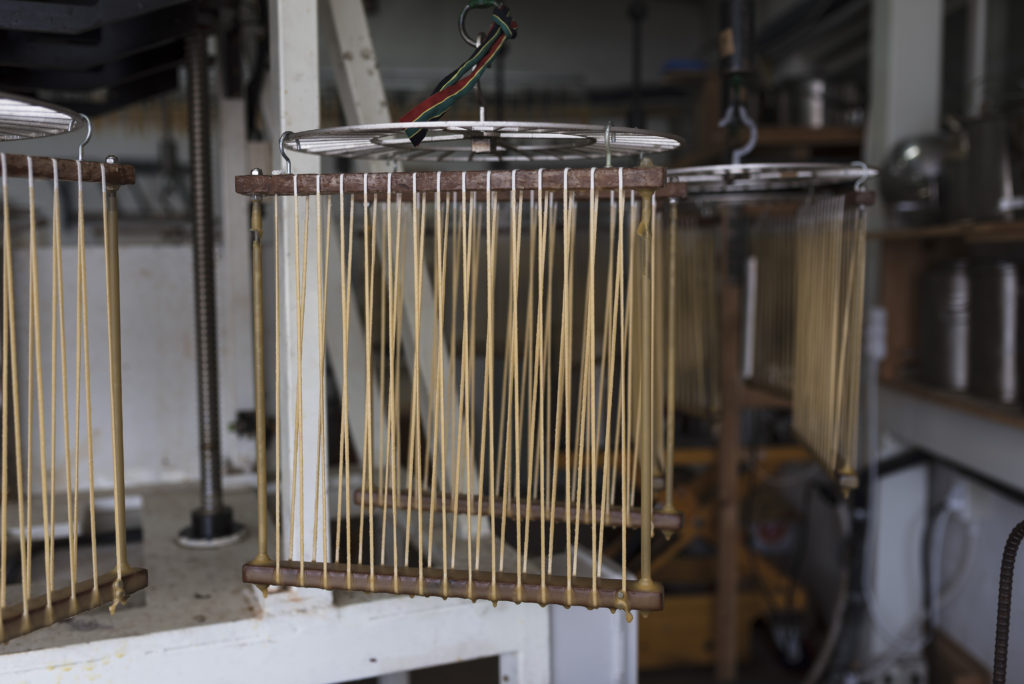
GN: Is there anything unique about the beeswax candles you make?
Bin: The beeswax candle market isn’t so big. We were the first, and we’re still the biggest and strongest in Korea. Now we have some followers. Some people pick it up out of nowhere and some learn from us directly. But they’re all on a much smaller scale than we are. I think we’re the biggest and the oldest.
GN: Do you have a class for people who want to learn candlemaking?
Bin: Yes, we do. But not on a regular basis. People come to us for lessons. In summer, for example, I do it outside. For this to happen, we prefer a group of ten or more people. Actually, that’s kind of our minimum. Sometimes, we have 30–50 or even over 100 people. That’s a little bit of an exception, but it’s all possible. We’ve had all kinds of classes, from schools and kindergartens to, of course, adult classes. We even do classes for other places, like environmental institutions. Also, other institutions ask me to do these classes at a civil servant educational center for small- and medium-sized business associations.
But that’s not our main source of income; we’re actually reluctant to do it [laughs]. It’s a lot of work and takes a lot of preparation, but we do it.
GN: Do you have any beehives here?
Bin: No, we don’t keep bees. We need a lot of beeswax, so it wouldn’t make sense. From one hive you can’t even get one kilo. We use three to four tons a year. There’re a lot of bees that actually work for us [laughs]. Instead, we get our beeswax from beekeepers all over the country. They send it to us already melted down in big blocks that we have to clean further. Later, we’ll work with a national beekeeper association.
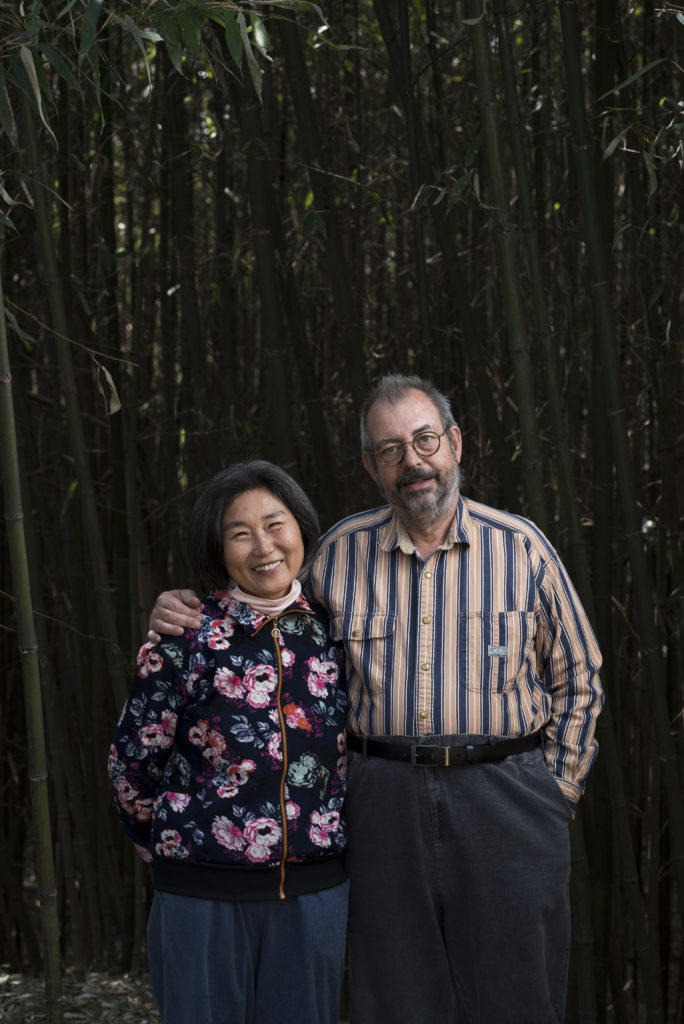
GN: Besides Korea, is there any other country in your candle market?
Bin: Sometimes we’re contacted by people involved with Korean craft products in Hong Kong. They just started selling some of our candles, but I don’t know how that works. We quite recently sent Easter candles to China and America. But I have to say, it was for a Korean sister who lives in a missionary station in China and America [laughs].
GN: If you don’t mind answering, how much do you sell in a year?
Bin: I must ask my boss for that [laughs].
Lee: Two hundred million won.
Bin: Two hundred million won a year in sales, not profit. So, that would be roughly 200,000 USD in sales per year. In profit, it’s maybe about 40–50 percent of that amount.
GN: How many workers are there in your candle factory?
Bin: Well, we don’t have regular workers. We have two or three young students who work for us. They come to work during vacation time and on weekends. We have one additional worker, but no regular workers. If we were to really employ somebody on a regular basis, then it would be for continuous work because we’d have to pay quite a lot of money as nowadays in Korea wages are going up. With the minimum-wage system and all the insurance fees we’d have to pay, it could be a burden. We’re at a difficult stage because our business is so big that we can’t do it all alone, yet it’s too small for us to have several regular employees.
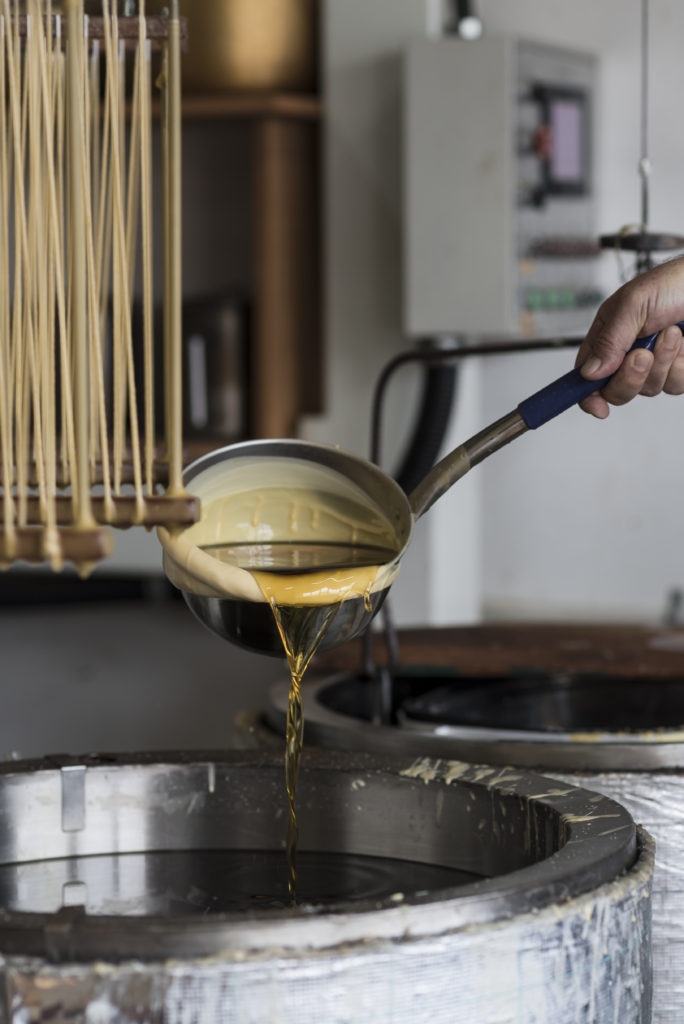
GN: Do you have a foreign customer base in Korea?
Bin: No, not really. Our website is basically in Korean. It gives some information and a telephone number for English services.
Lee: It’s not our target now.
Bin: We could probably do much more in marketing. But, you know, even though we can expand our capacity, we’re already quite busy. Most of our marketing and advertising comes indirectly from the television companies that come to our place quite frequently. There are hardly any Koreans now who haven’t seen us on TV. As far as I can judge from meeting people on the street, everybody knows about us and our business. For example, quite recently we had a feature on KBS for almost an hour.
Lee: That was last September. It was almost three weeks of shooting.
Bin: They keep on broadcasting this program many times. Obviously, they found it interesting enough to invest money in. That was a big feature that really got us into the collective memory of the TV-watching community in Korea, which is 99 percent of the population, as you know. It’s amazing. You know, this kind of documentary isn’t really something many are especially interested in Korea, but still, the people we talk to seem to recognize everything they see on TV. Now everybody knows what we’re doing, when we got married, and why [laughs]. So, after the TV shoot, we developed our own story. We have an official version.
GN: What’s your expectation for the future?
Bin: Our time is running out, as everybody’s is. But our time maybe running out faster because we’re older. So, we’re actually more in the process of slowing down. One aspect of this is to find somebody to pass the business on to because our children will definitely not live here and don’t want to do candlemaking in the middle of nowhere.
Lee: When I was their age, I never dreamed of living here.
Bin:Even me. We have two daughters and one son. Two of them are living in Germany and one’s living in Los Angeles. Our children definitely won’t come here, I’m quite sure of it.
Lee: Maybe the last one, she isn’t married yet. Our youngest daughter, she is our adopted child.
Bin:Maybe. But our children will not coming here. I’m quite sure about it. Our son is an architect working in Berlin at a nice company now. Our youngest daughter is actually selling our soap, which we make now, too. She finished her master’s in business or marketing or finance. I forget [laughs]. She runs a start-up in Berlin selling our candles and some other cosmetics together with friends. They’re busy going from exhibition to exhibition showing the products and making sure they’re all in the lifestyle magazines for the ladies. All of our stuff is female-related on the customer site.
At this time, Bin showed us photo documentation of his activities with Korean communities and environmental organizations, and took us on a tour of his workshop.
The Author
Zico is a master’s degree program student at Chonnam National University, majoring in interdisciplinary NGO studies. Hailing from Indonesia, he is also active as a human rights defender and pro-democracy activist. Zico likes reading, listening to music, sports, and traveling.

